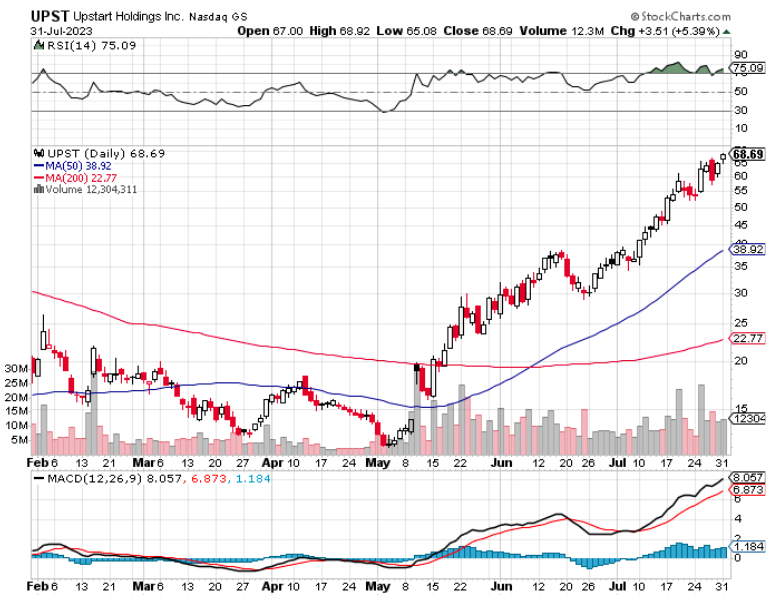THE AI-DRIVEN DAVID TAKING ON THE GOLIATH OF FICO SCORES
An AI-powered David is boldly challenging the Goliath in the credit landscape. Upstart (UPST), a groundbreaking fintech player, employs the power of this technology to critically evaluate borrowers, enabling financial establishments to make astute lending determinations.
What makes Upstart's strategy stand out is its gutsy move to outfox Fair Isaac's FICO score - a rating system that's reigned supreme in the credit market for over 30 years. Unlike the traditional method, this company pulls in a variety of aspects like career trajectory, academic background, and other distinct personal markers.
With this innovative approach, Upstart's AI-powered models are able to spread their loan-offering net wider, snagging more borrowers and serving up loans at friendlier rates. This not only trims down the specter of default but also makes it an enticing prospect for investors.
They're not just investing in a company, they're also potentially hitching a ride with a trailblazer aiming to flip the script on how creditworthiness is gauged, possibly shaking the very foundations of the $4 trillion consumer lending industry.
Its cutting-edge AI technology has the power to sift through a staggering 1,600 individual data points pertaining to a loan applicant in less time than it takes to blink. It’s so rapid that 84% of nods of approval are immediate and totally automated, bidding goodbye to the need for meddling human hands.
When you stack this up against the old guard FICO, it’s like comparing a supersonic jet to a horse and buggy. FICO meanders through a mere five core data parameters, and the time it takes for a human assessor to finally stamp their approval can be as long as a drawn-out cricket match.
That said, Upstart's journey in the stock market has seen its fair share of turbulence since its December 2020 IPO.
After debuting at a modest $20, the stock saw an impressive 780% surge by October 2021. However, the market's fickle nature was soon revealed.
By the end of 2022, Upstart had plummeted, losing a staggering 95% of its value. Then, as of July 26, 2023, it rallied, marking a dramatic 390% upswing.
Such dramatic shifts reflect the influence of interest rates and broader economic trends. When interest rates hovered below 1%, borrowing boomed, making Upstart a popular choice among loan seekers.
However, the Federal Reserve's series of interest rate hikes over the past 18 months caused a sharp decline in loan applications, impacting Upstart's fortunes.
In light of these fluctuations, Upstart's financial performance has faced significant challenges. In Q1, revenues fell to $103 million, marking a 67% year-on-year decline.
Loan originations via the platform fell by 78% to $997 million compared to the same period last year.
Net losses also spiked to $129 million, a steep drop from the net income of $32.7 million in Q1 of the previous year.
Despite these worrying trends, investors appear to be displaying unwavering faith in Upstart's future.
This optimism may stem from several positive developments during this period. Notably, Upstart secured an impressive $2 billion in funding for the next 12 months for its loans. In a significant vote of confidence, investment giant Castlelake also agreed to acquire $4 billion of Upstart's consumer loans.
The cash influx will likely encourage banks to approve more loans, while Upstart can avoid bearing these on its balance sheet.
Additionally, borrowers approved by Upstart's AI models experienced 53% fewer defaults than those approved by major U.S. banks at the same rate.
This implies that partnering banks could approve 173% more loans without a corresponding increase in default rates.
While it's exciting to envision Upstart flourishing half a decade from now, showcasing robust revenue growth and remarkable profitability, we must also remember the company's recent, significant downturn. Consequently, any future predictions come with a fair share of risk.
At present, Upstart's price-to-sales ratio stands at 7, reflecting the company's performance. This metric could be justified for a firm demonstrating rapid growth and high efficiency. But given Upstart's recent challenges, it might seem overvalued.
Upstart could prove a valuable addition to a portfolio at the right time. However, given the current inflated stock price, prospective investors might be better off waiting for a more attractive entry point signaled by positive news and more consistent performance.

